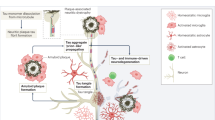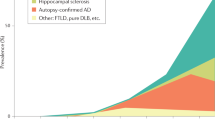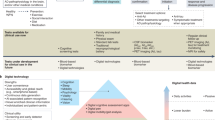Abstract
The combination of an aging population and the promise, possibly in the near future, of disease-modifying therapies have made the characterization of the early stages of Alzheimer's disease (AD) a topic of major research interest. In this article we review recent progress in our understanding of the evolution of early AD with particular reference to the symptomatic pre-dementia stage designated 'mild cognitive impairment', emphasizing work on the early cognitive profile and associated neuroimaging studies.
This is a preview of subscription content, access via your institution
Access options
Subscribe to this journal
Receive 12 print issues and online access
$209.00 per year
only $17.42 per issue
Buy this article
- Purchase on Springer Link
- Instant access to full article PDF
Prices may be subject to local taxes which are calculated during checkout





Similar content being viewed by others
References
Ritchie, K. & Lovestone, S. The dementias. Lancet 360, 1759–1766 (2002).
Terry, R.D. et al. Physical basis of cognitive alterations in Alzheimer's disease: synapse loss is the major correlate of cognitive impairment. Ann. Neurol. 30, 572–580 (1991).
Hyman, B.T., Van Hoesen, G.W., Damasio, A.R. & Barnes, C.L. Alzheimer's disease: cell-specific pathology isolates the hippocampal formation. Science 225, 1168–1170 (1984).
Braak, H. & Braak, E. Neuropathological staging of Alzheimer-related changes. Acta Neuropathol. 82, 239–259 (1991).
Arriagada, P.V., Growdon, J.H., Hedley-Whyte, E.T. & Hyman, B.T. Neurofibrillary tangles but not senile plaques parallel duration and severity of Alzheimer's disease. Neurology 42, 631–639 (1992).
De Lacoste, M.C. & White, C.L. The role of cortical connectivity in Alzheimer's disease pathogenesis: a review and model system. Neurobiol. Aging 14, 1–16 (1993).
Delacourte, A. et al. The biochemical pathway of neurofibrillary degeneration in aging and Alzheimer's disease. Neurology 52, 1158–1165 (1999).
Bondareff, W., Mountjoy, C.Q. & Roth, M. Loss of neurons of origin of the adrenergic projection to cerebral cortex (nucleus locus ceruleus) in senile dementia. Neurology 32, 164–168 (1982).
Mann, D.M.A., Yates, P.O. & Marcyniuk, B. A comparison of changes in the nucleus basalis and locus caeruleus in Alzheimer's disease. J. Neurol. Neurosurg. Psychiatry 47, 201–203 (1984).
Whitehouse, P.J. et al. Alzheimer's disease and senile dementia: loss of neurons in the basal forebrain. Science 215, 1237–1239 (1982).
Welsh, K.A., Butters, N., Hughes, J.P., Mohs, R.C. & Heyman, A. Detection and staging of dementia in Alzheimer's disease: use of the neuropsychological measures developed for the Consortium to Establish a Registry for Alzheimer's Disease. Arch. Neurol. 49, 448–452 (1992).
Galton, C.J., Patterson, K., Xuereb, J.H. & Hodges, J.R. Atypical and typical presentations of Alzheimer's disease: a clinical, neuropsychological, neuroimaging and pathological study of 13 cases. Brain 123, 484–498 (2000).
Perry, R.J. & Hodges, J.R. Attention and executive deficits in Alzheimer's disease: a critical review. Brain 122, 383–404 (1999).
Perry, R.J., Watson, P. & Hodges, J.R. The nature and staging of attention dysfunction in early (minimal and mild) Alzheimer's disease: relationship to episodic and semantic memory impairment. Neuropsychologia 38, 252–271 (2000).
Lambon-Ralph, M.A., Patterson, K., Graham, N., Dawson, K. & Hodges, J.R. Homogeneity and heterogeneity in mild cognitive impairment and Alzheimer's disease: a cross-sectional and longitudinal study of 55 cases. Brain 126, 2350–2362 (2003).
Petersen, R.C. Mild Cognitive Impairment (Oxford University Press, New York, 2003).
Ritchie, K. & Touchon, J. Mild cognitive impairment: conceptual basis and current nosological status. Lancet 355, 225–228 (2000).
DeCarli, C. Mild cognitive impairment: prevalence, prognosis, aetiology, and treatment. Lancet Neurology 2, 15–21 (2003).
Grundman, M. et al. Mild cognitive impairment can be distinguished from Alzheimer disease and normal aging for clinical trials. Arch. Neurol. 61, 59–66 (2004).
Chertkow, H. Mild cognitive impairment. Curr. Opin. Neurol. 15, 401–407 (2002).
Folstein, M.F., Folstein, S.E. & McHugh, P.R. “Mini-mental state”. A practical method for grading the cognitive state of patients for the clinician. J. Psychiatr. Res. 12, 189–198 (1975).
Morris, J.C. et al. Mild cognitive impairment represents early-stage Alzheimer disease. Arch. Neurol. 58, 397–405 (2001).
Petersen, R.C. et al. Practice parameter: early detection of dementia: mild cognitive impairment (an evidence-based review). Report of the Quality Standards Subcommittee of the American Academy of Neurology. Neurology 56, 1133–1142 (2001).
Celsis, P. Age-related cognitive decline, mild cognitive impairment or preclinical Alzheimer's disease? Ann. Med. 32, 6–14 (2000).
Ritchie, K., Artero, S. & Touchon, J. Classification criteria for mild cognitive impairment—a population-based validation study. Neurology 56, 37–42 (2001).
Blennow, K. & Hampel, H. CSF markers for incipient Alzheimer's disease. Lancet Neurology 2, 605–613 (2003).
Fuld, P.A., Masur, D.M., Blau, A.D., Crystal, H. & Aronson, M.K. Object-memory evaluation for prospective detection of dementia in normal functioning elderly: predictive and normative data. J. Clin. Exp. Neuropsychol. 12, 520–528 (1990).
Linn, R.T. et al. The “preclinical phase” of probable Alzheimer's disease: a 13-year prospective study of the Framingham cohort. Arch. Neurol. 52, 485–490 (1995).
Masur, D.M., Sliwinski, M., Lipton, R.B., Blau, A.D. & Crystal, H.A. Neuropsychological prediction of dementia and the absence of dementia in healthy elderly persons. Neurology 44, 1427–1432 (1994).
Rubin, E.H. et al. A prospective study of cognitive function and onset of dementia in cognitively healthy elders. Arch. Neurol. 55, 395–401 (1998).
Chen, P. et al. Cognitive tests that best discriminate between presymptomatic AD and those who remain nondemented. Neurology 55, 1847–1853 (2000).
Orgogozo, J.M., Fabrigoule, C., Rouch, I., Amieva, H. & Dartigues, J.F. Prediction and early diagnosis of Alzheimer's disease with simple neuropsychological tests. Int. J. Geriatr. Psychopharmacol. 2, 60–67 (2000).
Fabrigoule, C. et al. Cognitive process in preclinical phase of dementia. Brain 121, 135–141 (1998).
Fox, N.C., Warrington, E.K., Seiffer, A.L., Agnew, S.K. & Rossor, M.N. Presymptomatic cognitive deficits in individuals at risk of familial Alzhiemer's disease: a longitudinal prospective study. Brain 121, 1631–1639 (1998).
Tierney, M.C. et al. Prediction of probable Alzheimer's disease in memory-impaired patients—a prospective longitudinal study. Neurology 46, 661–665 (1996).
Albert, M.S., Moss, M.B., Tanzi, R. & Jones, K. Preclinical prediction of AD using neuropsychological tests. J. Int. Neuropsychol. Soc. 7, 631–639 (2001).
Devanand, D.P., Folz, M., Gorlyn, M., Moeller, J.R. & Stern, Y. Questionable dementia: clinical course and predictors of outcome. J. Am. Geriatr. Soc. 45, 321–328 (1997).
Flicker, C., Feris, S. & Reisberg, B. Mild cognitive impairment in the elderly: predictors of dementia. Neurology 41, 1006–1009 (1991).
Thompson, S.A., Graham, K.S., Patterson, K., Sahakian, B.J. & Hodges, J.R. Is knowledge of famous people disproportionately impaired in patients with early Alzheimer's disease? Neuropsychology 16, 344–358 (2002).
Delazer, M., Semenza, C., Reiner, M., Hofer, R. & Benke, T. Anomia for people names in DAT—evidence for semantic and post semantic impairments. Neuropsychologia 41, 1593–1598 (2003).
Estevez-Gonzalez, A. et al. Semantic knowledge of famous people in mild cognitive impairment and progression to Alzheimer's disease. Dement. Geriatr. Cogn. Disord. 17, 188–195 (2004).
Swainson, R. et al. Early detection and differential diagnosis of Alzheimer's disease and depression with neuropsychological tasks. Dement. Geriatr. Cogn. Disord. 12, 265–280 (2001).
Blackwell, A.D. et al. Detecting dementia: novel neuropsychological markers of pre-clinical Alzheimer's disease. Dement. Geriatr. Cogn. Disord. 17, 42–48 (2004).
Fowler, K.S., Saling, M.M., Conway, E.L., Semple, J.M. & Louis, W.J. Computerized delayed matching to sample and paired associate performance in the early detection of dementia. Appl. Neuropsychol. 2, 72–78 (1995).
Fowler, K.S., Saling, M.M., Conway, E.L., Semple, J.M. & Louis, W.J. Computerized neuropsychological tests in the early detection of dementia: prospective findings. J. Int. Neuropsychol. Soc. 3, 139–146 (1997).
Lee, A.C.H., Rahman, S., Hodges, J.R., Sahakian, B. & Graham, K.S. Associative and recognition memory for novel objects in dementia: implications for diagnosis. Eur. J. Neurosci. 18, 1660–1670 (2003).
Perry, R.J. & Hodges, J. Attentional control and the time course of attention in mild cognitive impairment measurement of attentional dwell time. Eur. J. Neurosci. 18, 221–226 (2003).
Darby, D., Maruff, P., Collie, A. & McStephen, M. Mild cognitive impairment can be detected by multiple assessments in a single day. Neurology 59, 1042–1046 (2002).
Dwolatzky, T. et al. Validity of a novel computerized cognitive battery for mild cognitive impairment. BMC Geriatr. 3, 4 (2003).
Du, A. et al. Magnetic resonance imaging of the entorhinal cortex and hippocampus in mild cognitive impairment and Alzheimer's disease. J. Neurol. Neurosurg. Psychiatry 71, 441–447 (2001).
Jack, C.R.J. et al. Antemortem MRI findings correlate with hippocampal neuropathology in typical aging and dementia. Neurology 58, 750–757 (2002).
Jack, C.R.J. et al. Medial temporal atrophy on MRI in normal ageing and very mild Alzheimer's disease. Neurology 49, 786–794 (1997).
Killiany, R.J. et al. Use of structural magnetic resonance imaging to predict who will get Alzheimer's disease. Ann. Neurol. 47, 430–439 (2000).
Scheltens, P., Fox, N., Barkhof, F. & De Carli, C. Structural magnetic resonance imaging in the practical assessment of dementia: beyond exclusion. Lancet Neurol. 1, 13–21 (2002).
Killiany, R.J. et al. MRI measures of entorhinal cortex vs hippocampus in preclinical AD. Neurology 58, 1188–1196 (2002).
Jack, C.R., Jr. et al. Prediction of AD with MRI-based hippocampal volume in mild cognitive impairment. Neurology 52, 1397–1403 (1999).
Visser, P.J. et al. Medial temporal lobe atrophy and memory dysfunction as predictors for dementia in subjects with mild cognitive impairment. J. Neurol. 246, 477–485 (1999).
Visser, P.J., Verhey, F.R., Hofman, P.A., Scheltens, P. & Jolles, J. Medial temporal lobe atrophy predicts Alzheimer's disease in patients with minor cognitive impairment. J. Neurol. Neurosurg. Psychiatry 72, 491–497 (2002).
Dickerson, B.C. et al. MRI-derived entorhinal and hippocampal atrophy in incipient and very mild Alzheimer's disease. Neurobiol. Aging 22, 747–754 (2001).
Braak, H. & Braak, E. Evolution of the neuropathology of Alzheimer's disease. Acta Neurolog. Scand. 165, 3–12 (1996).
Xu, Y. et al. Usefulness of MRI measures of entorhinal cortex versus hippocampus in AD. Neurology 54, 1760–1767 (2000).
Goncharova, I.I., Dickerson, B.C., Stoub, T.R. & deToledo-Morrell, L. MRI of human entorhinal cortex: a reliable protocol for volumetric measurement. Neurobiol. Aging 22, 737–745 (2001).
Scheltens, P. et al. Atrophy of medial temporal lobes on MRI in “probable” Alzheimer's disease and normal ageing: diagnostic value and neuropsychological correlates. J. Neurol. Neurosurg. Psychiatry 55, 967–972 (1992).
Galton, C.J. et al. The temporal lobe rating scale: application to Alzheimer's disease and frontotemporal dementia. J. Neurol. Neurosurg. Psychiatry 70, 165–173 (2001).
De Leon, M.J. et al. Measurement of medial temporal lobe atrophy in diagnosis of Alzheimer's disease. Lancet 341, 125–126 (1993).
De Leon, M.J. et al. The radiologic prediction of Alzheimer disease: the atrophic hippocampal formation. Am. J. Neuroradiol. 14, 897–906 (1993).
Korf, E.S.C., Wahlund, L.O., Visser, P.J. & Scheltens, P. Medial temporal lobe atrophy on MRI predicts dementia in subjects with mild cognitive impairment. Neurology (2004), in the press.
Graham, J.E. et al. Prevalence and severity of cognitive impairment with and without dementia in an elderly population. Lancet 349, 1793–1796 (1997).
Di Carlo, A. et al. Cognitive impairment without dementia in older people: prevalence, vascular risk factors, impact on disability. The Italian Longitudinal Study on Ageing. J. Am. Geriatr. Soc. 48, 775–782 (2000).
Petersen, R.C. et al. Apolipoprotein E status as a predictor of the development of Alzheimer's disease in memory-impaired individuals. JAMA 273, 1274–1278 (1995).
Fox, N.C., Freeborough, P.A. & Rossor, M.N. Visualisation and quantification of rates of atrophy in Alzheimer's disease. Lancet 348, 94–97 (1996).
Scahill, R.I. et al. A longitudinal study of brain volume changes in normal aging using serial registered magnetic resonance imaging. Arch. Neurol. 60, 989–994 (2003).
Schott, J.M. et al. Assessing the onset of structural change in familial Alzheimer's disease. Ann. Neurol. 53, 181–188 (2003).
Jack, C.R.J. et al. Comparison of different MRI brain atrophy rate measures with clinical disease progression in AD. Neurology 62, 591–600 (2004).
Rombouts, S.A., Barkhof, F., Witter, M.P. & Scheltens, P. Unbiased whole-brain analysis of gray matter loss in Alzheimer's disease. Neurosci. Lett. 285, 231–233 (2000).
Chetelat, G. et al. Mapping gray matter loss with voxel-based morphometry in mild cognitive impairment. Neuroreport 13, 1939–1943 (2002).
Van der Flier, W.M. et al. Cognitive decline in AD and mild cognitive impairment is associated with global brain damage. Neurology 59, 874–879 (2002).
Wolf, H. et al. A critical discussion of the role of neuroimaging in mild cognitive impairment. Acta Neurolog. Scand. Suppl. 179, 52–76 (2003).
Fukuyama, H. et al. Coronal reconstruction images of glucose metabolism in Alzheimer's disease. J. Neurol. Sci. 106, 128–134 (1991).
Ishii, K. et al. Relatively preserved hippocampal glucose metabolism in mild Alzheimer's disease. Dement. Geriatr. Cogn. Disord. 9, 317–322 (1998).
Ishii, K., Kitagaki, H., Kono, M. & Mori, E. Decreased medial temporal oxygen metabolism in Alzheimer's diseasse shown by PET. J. Nucl. Med. 37, 1159–1165 (1996).
Jagust, W.J. et al. The cortical topography of temporal lobe hypometabolism in early Alzheimer's disease. Brain Res. 629, 189–198 (1993).
Ouchi, Y. et al. Altered glucose metabolism in the hippocampal head in memory impairment. Neurology 136–142 (1998).
Minoshima, S. et al. Metabolic reduction in the posterior cingulate cortex in very early Alzheimer's disease. Ann. Neurol. 42, 85–94 (1997).
Kogure, D. et al. Longitudinal evaluation of early Alzheimer's disease using brain perfusion SPECT. J. Nucl. Med. 41, 1155–1162 (2000).
Johnson, K.A. et al. Preclinical prediction of Alzheimer's disease using SPECT. Neurology 50, 1563–1571 (1998).
Huang, C., Wahlund, L.O., Svensson, L., Winblad, B. & Julin, P. Cingulate cortex hypoperfusion predicts Alzheimer's disease in mild cognitive impairment. BMC Neurol. 2, 9 (2002).
Nestor, P.J., Fryer, T.D., Ikeda, M. & Hodges, J.R. Retrosplenial cortex (BA29/30) hypometabolism in mild cognitive impairment (prodromal Alzheimer's disease). Eur. J. Neurosci. 18, 2663–2667 (2003).
Chetelat, G. et al. Mild cognitive impairment. Can FDG-PET predict who is to rapidly convert to Alzheimer's disease? Neurology 60, 1374–1377 (2003).
Drzezga, A. et al. Cerebral metabolic changes accompanying conversion of mild cognitive impairment into Alzheimer's disease: a PET follow-up study. Eur. J. Nucl. Med. Mol. Imaging 30, 1104–1113 (2003).
Arnaiz, E. et al. Impaired cerebral glucose metabolism and cognitive functioning predict deterioration in mild cognitive impairment. Neuroreport 12, 851–855 (2001).
De Santi, S. et al. Hippocampal formation glucose metabolism and volume losses in MCI and AD. Neurobiol. Aging 22, 529–539 (2001).
Nestor, P.J., Fryer, T.D., Smielewski, P. & Hodges, J.R. Limbic hypometabolism in Alzheimer's disease and mild cognitive impairment. Ann. Neurol. 54, 343–351 (2003).
Kadekaro, M., Crane, A.M. & Sokoloff, L. Differential effects of electrical stimulation of sciatic nerve on metabolic activity in spinal cord and dorsal root ganglion in the rat. Proc. Natl. Acad. Sci. USA 82, 6010–6013 (1985).
Minoshima, S., Cross, D.J., Foster, N.L., Henry, T.R. & Kuhl, D.E. Discordance between traditional pathologic and energy metabolic changes in very early Alzheimer's disease. Pathophysiological implications. Ann. NY Acad. Sci. 893, 350–352 (1999).
Scahill, R.I., Schott, J.M., Stevens, J.M., Rossor, M.N. & Fox, N.C. Mapping the evolution of regional atrophy in Alzheimer's disease: unbiased analysis of fluid-registered serial MRI. Proc. Natl. Acad. Sci. USA 99, 4703–4707 (2002).
Chetelat, G. et al. Dissociating atrophy and hypometabolism impact on episodic memory in mild cognitive impairment. Brain 126, 1955–1967 (2003).
Cabeza, R. & Nyberg, L. Imaging cognition II: an empirical review of 275 PET and fMRI studies. J. Cogn. Neurosci. 12, 1–47 (2000).
Francis, P.T., Palmer, A.M., Snape, M. & Wilcock, G.K. The cholinergic hypothesis of Alzheimer's disease: a review of progress. J. Neurol. Neurosurg. Psychiatry 66, 137–147 (1999).
Kuhl, D.E. et al. In vivo mapping of cerebral acetylcholinesterase activity in aging and Alzheimer's disease. Neurology 52, 691–699 (1999).
Rinne, J.O. et al. Brain acetylcholinesterase activity in mild cognitive impairment and early Alzheimer's disease. J. Neurol. Neurosurg. Psychiatry 74, 113–115 (2003).
Tiraboschi, P. et al. The decline in synapses and cholinergic activity is asynchronous in Alzheimer's disease. Neurology 55, 1278–1283 (2000).
DeKosky, S.T. et al. Upregulation of choline acetyltransferase activity in hippocampus and frontal cortex of elderly subjects with mild cognitive impairment. Ann. Neurol. 51, 145–155 (2002).
Sarter, M., Bruno, J.P. & Givens, B. Attentional functions of cortical cholinergic inputs: what does it mean for learning and memory? Neurobiol. Learn. Mem. 80, 245–256 (2003).
Backman, L. et al. Brain regions associated with episodic retrieval in normal aging and Alzheimer's disease. Neurology 52, 1861–1870 (1999).
Becker, J.T. et al. Compensatory reallocation of brain resources supporting verbal episodic memory in Alzheimer's disease. Neurology 46, 692–700 (1996).
Klunk, W.E. et al. Imaging brain amyloid in Alzheimer's disease with Pittsburgh Compound-B. Ann. Neurol. 55, 306–319 (2004).
Author information
Authors and Affiliations
Corresponding author
Ethics declarations
Competing interests
The authors declare no competing financial interests.
Rights and permissions
About this article
Cite this article
Nestor, P., Scheltens, P. & Hodges, J. Advances in the early detection of Alzheimer's disease. Nat Med 10 (Suppl 7), S34–S41 (2004). https://doi.org/10.1038/nrn1433
Received:
Accepted:
Published:
Issue Date:
DOI: https://doi.org/10.1038/nrn1433
This article is cited by
-
Recent Advances in Photoelectrochemical Sensing of Alzheimer’s Biomarkers
BioChip Journal (2023)
-
Isoproterenol, an adrenergic β receptor agonist, induces metallothionein synthesis followed by canceling amyloid β1-42-induced neurodegeneration
BioMetals (2022)
-
Rivastigmine improves dual-task gait velocity in patients with Alzheimer’s disease
BMC Neurology (2021)



